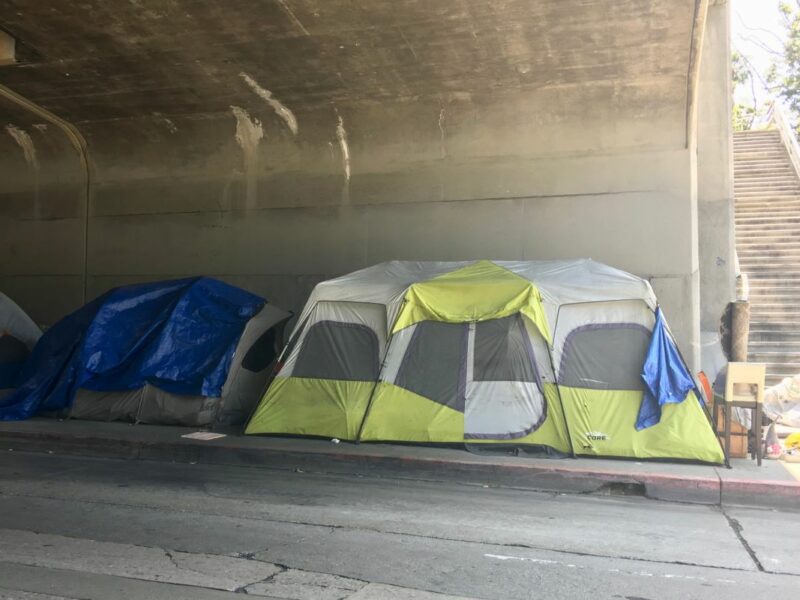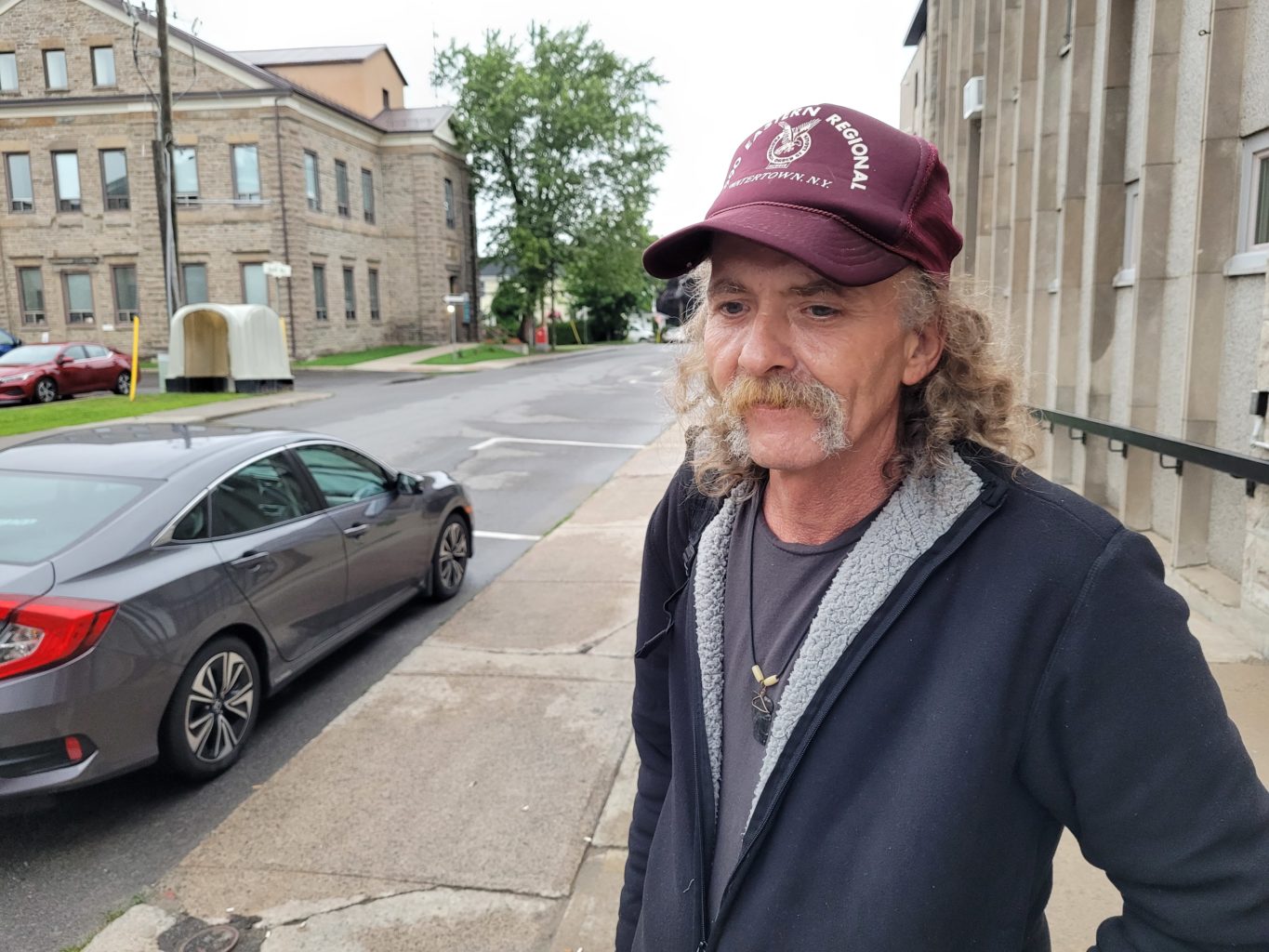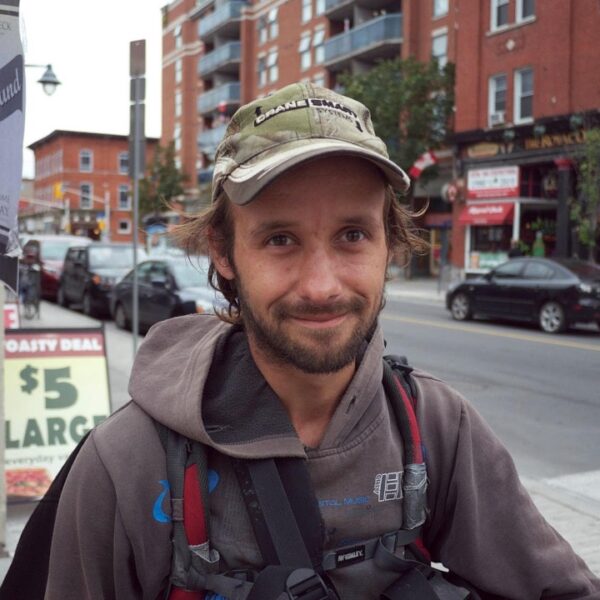At 59 years old, Jim feels the strain of homelessness in ways others might never have. His disappointment in his situation is palatable and understandable.
He mentions being happy that his local drop-in program recently expanded operating hours. The program has helped him put on weight and make new friends. Yet, he is still painfully aware that many of the services he depends on aren’t available until hours after the program closes.
His opinions of the community are not always quite as warm. When asked if he ever feels discriminated against for being poor and looking disheveled, he mentions anxiety and fear around police officers. Jim cites a lack of empathy from business owners that he has interacted with downtown.
“It’s a shitty feeling. Especially with the cops,” he explains. “I’ve seen it happen too many times. Rough and unnecessary questioning. Feeling singled out. I feel judged every day.”
His anxieties might come as an expected reality for some, but his backstory paints a different picture.
He can’t recall any significant interactions with law enforcement since he was caught driving without a license in 1998.
And other than traffic tickets and some juvenile mischief over 40 years ago, he has largely kept to himself.
For him, his barriers to housing aren’t based on compromised mental health or substance use disorder. As a recipient of the Ontario Disability Support Program, he struggles with a physical injury that keeps him from working.
He also has an open wound that he is struggling to heal. Despite his wounds and a damaged hand, he seems to be in decent overall health.
For him, his issues are housing affordability and a lack of available rental supply.
Living in the quiet city of Brockville, Ontario, Jim has been homeless since last December. And for the first time in his life, he feels trapped.
Skyrocketing real estate prices are evident as rental costs are beyond reach. Being priced out of private market housing, Jim is exhausted by this newfound reality.
After recently viewing an apartment that was advertised and listed as in his price range, he is once again discouraged.
If he were to access the full support available for accommodations through his disability support entitlement, a one-bedroom apartment listed at $760 with all-inclusive utilities would have been manageable. The problem is he was one of 46 people who viewed the apartment in a small town with a depleting stock of available rentals.
After a bidding war ensued, that same one-bedroom apartment was listed at $1,260 just one week later.
Defeated again, Jim returned to his local warming centre with sadness and battling chronic pain. But he does so with gratitude that a program like this exists for people like him.
Jim isn’t your average 59-year-old man. He is easily one of a kind.
Resilient, cordial, and jovial, Jim is magnetic. With an infectious laugh and a sense of humour that few in his position would exhibit quite as freely, he is unforgettable.
A favourite client of staff, and a trusted friend to many in his position, his circumstance illustrates a housing crisis in ways we cannot excuse.
Jim doesn’t have many options with so much of the available nonprofit housing stock limited to priority lists and family housing. Between couch surfing and sleeping in tents by the train tracks, his situation seems like it should be easily remedied.
The reality of homelessness in a small town is it can often be relieved. Disputes and life circumstances happen in all walks of life. But why a charming 59-year-old man with an identifiable disability is homeless in a city as prosperous as Brockville is alarming. It is a tragedy that we cannot ignore.
When asked how many places Jim has viewed, he responds between two and four places a month. He shows up every time, yet often doesn’t even get a callback. Jim speaks about invasive applications that are up to 20 pages. He is upset that not only is the price point an obstacle, but expectations on applicants deter him from trying.
With a hand injury stemming from factory work, Jim has been nursing a damaged extremity since a 16-ton punch press crushed it in 1979. About three years ago, he was injured again by a table saw while renovating his former home. He feels lucky because he almost lost his fingers, but medical personnel saved them. His injuries are not minor, even though he has adapted to daily life with this setback. Plus, injury comes with pain.
A return to steady work seems unlikely aside from under-the-table jobs void of proper protections.
After years in substandard housing and strained relationships with those sharing his neighbourhood, Jim left behind a place that carried many unfortunate encounters. He never dreamed leaving a hostile place would keep him stuck in the abyss of homelessness in his senior years.
Now, as this lifestyle takes hold, he sometimes finds himself relying on colourful characters he would otherwise avoid. Jim is eagerly searching for a place to rest comfortably. One that he can call home.
Becoming homeless during a health pandemic has been eye-opening for him. Jim vocalized his disenfranchisement when so many public restrooms remained closed and so many restaurants opened strictly for drive-thru traffic.
As he carted his belongings with him, the pain of being ostracized and criticized based on his appearance is a pain he won’t soon forget.
“People look at me differently now. Servers are more likely to give me a hard time if my clothes aren’t clean or I’m carrying bags with me. Even when I have my own money to spend, many places make me feel unwelcome,” he explained.
Jim talked openly about being through quite the ordeal.
He’s navigating piecemeal social service systems and seeking temporary places to use as a mailing address. He also deals with local law enforcement called to move him along when he has been resting in a public place.
In his brief time on the streets, he has seen a lot of things. He worries for his new friends. He worries for himself. Jim is currently living between his local warming centre and a tent he obtained through the Brockville Street friends. While he enjoys camping, he worries about what will happen when the weather changes.
Stuck between a rock and a hard place, he often deals with others like him who turn to his campsite as a safe place to find support. While always welcoming others with open arms, he prefers a lower profile. He voices concerns about theft and conflict.
He just wishes that he had somewhere safe to hang his hat in a city where he has spent his life.
“I love camping,” he said. “But it is buggy, and a lot of the company that I wouldn’t normally keep tends to come around my tent. I wish the city had a place where people could safely pitch a tent—a place for people like me. We need more shelters, and we need more housing. We need more people to care. And if they don’t care, then we at least need somewhere to go where we won’t be bothered or hurt.”
Jim is a father. He has called Brockville home for decades, growing up and building a life here. Now he worries about the next rainfall.
In between stories of taking in friends in need when he had the resources and telling jokes to make others laugh, Jim plots out his evening plans.
Rainfall means putting on an extra coat or turning on our windshield wipers for so many of us. Maybe even stay home. For Jim, it means a gamble between cold and flu or the possibility of more mosquitos. It could mean damaged belongings and soggy feet. Even some of the simplest decisions become complicated for Jim because he can’t take anything for granted. He can’t second guess himself.
Approaching 60 years old with a disability, the only solace to look forward to is a campfire and a hot plate in a city of immense wealth and industry. And yet, he doesn’t complain. It isn’t in his nature. He is too busy enjoying the fresh air and making others smile to let depression get the best of him.
Jim could be anyone living paycheck to paycheck on a fixed income. Except he isn’t saving for a rainy day. He’s praying they pass by him. One can’t help but wonder, how did our world get this way?













